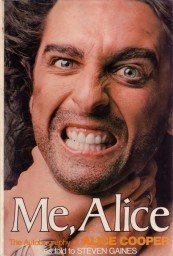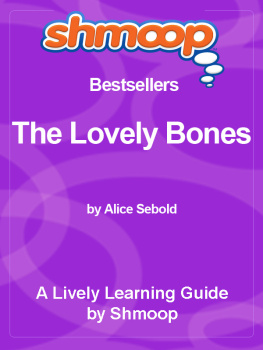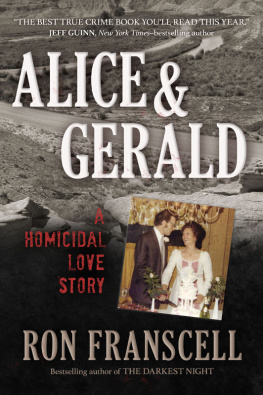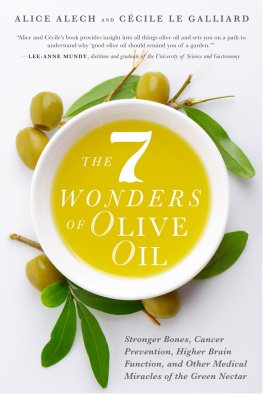Alice Sebold - The Lovely Bones
Here you can read online Alice Sebold - The Lovely Bones full text of the book (entire story) in english for free. Download pdf and epub, get meaning, cover and reviews about this ebook. year: 2002, publisher: Little, Brown and Company, genre: Art. Description of the work, (preface) as well as reviews are available. Best literature library LitArk.com created for fans of good reading and offers a wide selection of genres:
Romance novel
Science fiction
Adventure
Detective
Science
History
Home and family
Prose
Art
Politics
Computer
Non-fiction
Religion
Business
Children
Humor
Choose a favorite category and find really read worthwhile books. Enjoy immersion in the world of imagination, feel the emotions of the characters or learn something new for yourself, make an fascinating discovery.

- Book:The Lovely Bones
- Author:
- Publisher:Little, Brown and Company
- Genre:
- Year:2002
- Rating:3 / 5
- Favourites:Add to favourites
- Your mark:
- 60
- 1
- 2
- 3
- 4
- 5
The Lovely Bones: summary, description and annotation
We offer to read an annotation, description, summary or preface (depends on what the author of the book "The Lovely Bones" wrote himself). If you haven't found the necessary information about the book — write in the comments, we will try to find it.
The Lovely Bones — read online for free the complete book (whole text) full work
Below is the text of the book, divided by pages. System saving the place of the last page read, allows you to conveniently read the book "The Lovely Bones" online for free, without having to search again every time where you left off. Put a bookmark, and you can go to the page where you finished reading at any time.
Font size:
Interval:
Bookmark:
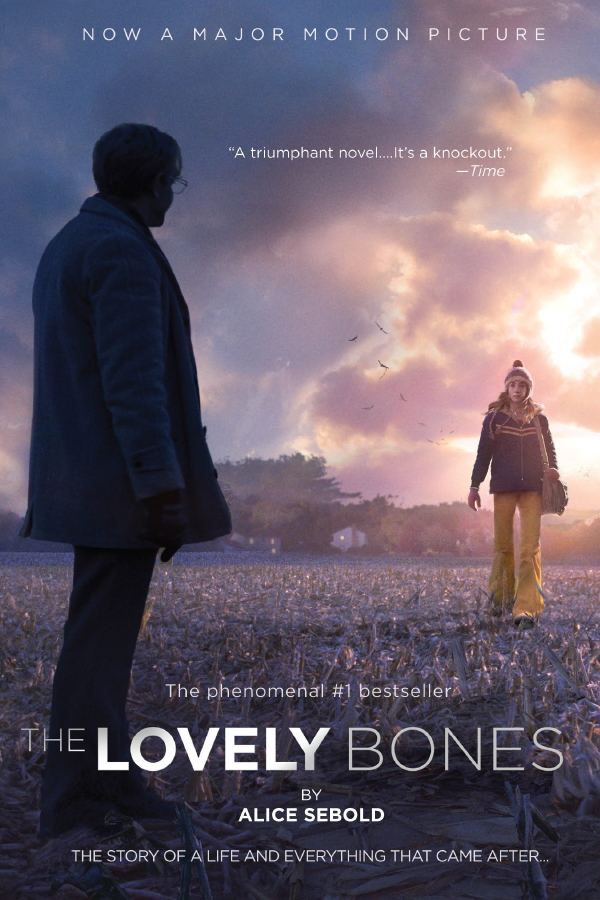
Copyright 2002 by Alice Sebold
All rights reserved. No part of this book may be reproduced in any form or by any electronic or mechanical means, including information storage and retrieval systems, without permission in writing from the publisher, except by a reviewer who may quote brief passages in a review.
First Edition
The characters and events in this book are ctitious.
Any similarity to real persons, living or dead, is coincidental and not intended by the author.
Hachette Book Group,
237 Park Avenue
New York, NY 10017,
Visit our website at www.HachetteBookGroup.com.
First eBook Edition: August 2002
ISBN: 978-0-7595-2773-7
Lucky
Always, Glen
Inside the snow globe on my fathers desk, there was a penguin wearing a red-and-white-striped scarf. When I was little my father would pull me into his lap and reach for the snow globe. He would turn it over, letting all the snow collect on the top, then quickly invert it. The two of us watched the snow fall gently around the penguin. The penguin was alone in there, I thought, and I worried for him. When I told my father this, he said, Dont worry, Susie; he has a nice life. Hes trapped in a perfect world.
M y name was Salmon, like the sh; rst name, Susie. I was fourteen when I was murdered on December 6, 1973. In newspaper photos of missing girls from the seventies, most looked like me: white girls with mousy brown hair. This was before kids of all races and genders started appearing on milk cartons or in the daily mail. It was still back when people believed things like that didnt happen.
In my junior high yearbook I had a quote from a Spanish poet my sister had turned me on to, Juan Ramn Jimnez. It went like this: If they give you ruled paper, write the other way. I chose it both because it expressed my contempt for my structured surroundings la the classroom and because, not being some dopey quote from a rock group, I thought it marked me as literary. I was a member of the Chess Club and Chem Club and burned everything I tried to make in Mrs. Delminicos home ec class. My favorite teacher was Mr. Botte, who taught biology and liked to animate the frogs and crawsh we had to dissect by making them dance in their waxed pans.
I wasnt killed by Mr. Botte, by the way. Dont think every person youre going to meet in here is suspect. Thats the problem. You never know. Mr. Botte came to my memorial (as, may I add, did almost the entire junior high schoolI was never so popular) and cried quite a bit. He had a sick kid. We all knew this, so when he laughed at his own jokes, which were rusty way before I had him, we laughed too, forcing it sometimes just to make him happy. His daughter died a year and a half after I did. She had leukemia, but I never saw her in my heaven.
My murderer was a man from our neighborhood. My mother liked his border owers, and my father talked to him once about fertilizer. My murderer believed in old-fashioned things like eggshells and coffee grounds, which he said his own mother had used. My father came home smiling, making jokes about how the mans garden might be beautiful but it would stink to high heaven once a heat wave hit.
But on December 6, 1973, it was snowing, and I took a shortcut through the corneld back from the junior high. It was dark out because the days were shorter in winter, and I remember how the broken cornstalks made my walk more difcult. The snow was falling lightly, like a urry of small hands, and I was breathing through my nose until it was running so much that I had to open my mouth. Six feet from where Mr. Harvey stood, I stuck my tongue out to taste a snowake.
Dont let me startle you, Mr. Harvey said.
Of course, in a corneld, in the dark, I was startled. After I was dead I thought about how there had been the light scent of cologne in the air but that I had not been paying attention, or thought it was coming from one of the houses up ahead.
Mr. Harvey, I said.
Youre the older Salmon girl, right?
Yes.
How are your folks?
Although the eldest in my family and good at acing a science quiz, I had never felt comfortable with adults.
Fine, I said. I was cold, but the natural authority of his age, and the added fact that he was a neighbor and had talked to my father about fertilizer, rooted me to the spot.
Ive built something back here, he said. Would you like to see?
Im sort of cold, Mr. Harvey, I said, and my mom likes me home before dark.
Its after dark, Susie, he said.
I wish now that I had known this was weird. I had never told him my name. I guess I thought my father had told him one of the embarrassing anecdotes he saw merely as loving testaments to his children. My father was the kind of dad who kept a nude photo of you when you were three in the downstairs bathroom, the one that guests would use. He did this to my little sister, Lindsey, thank God. At least I was spared that indignity. But he liked to tell a story about how, once Lindsey was born, I was so jealous that one day while he was on the phone in the other room, I moved down the couchhe could see me from where he stoodand tried to pee on top of Lindsey in her carrier. This story humiliated me every time he told it, to the pastor of our church, to our neighbor Mrs. Stead, who was a therapist and whose take on it he wanted to hear, and to everyone who ever said Susie has a lot of spunk!
Spunk! my father would say. Let me tell you about spunk, and he would launch immediately into his Susie-peed-on-Lindsey story.
But as it turned out, my father had not mentioned us to Mr. Harvey or told him the Susie-peed-on-Lindsey story.
Mr. Harvey would later say these words to my mother when he ran into her on the street: I heard about the horrible, horrible tragedy. What was your daughters name, again?
Susie, my mother said, bracing up under the weight of it, a weight that she naively hoped might lighten someday, not knowing that it would only go on to hurt in new and varied ways for the rest of her life.
Mr. Harvey told her the usual: I hope they get the bastard. Im sorry for your loss.
I was in my heaven by that time, tting my limbs together, and couldnt believe his audacity. The man has no shame, I said to Franny, my intake counselor. Exactly, she said, and made her point as simply as that. There wasnt a lot of bullshit in my heaven.
Mr. Harvey said it would only take a minute, so I followed him a little farther into the corneld, where fewer stalks were broken off because no one used it as a shortcut to the junior high. My mom had told my baby brother, Buckley, that the corn in the eld was inedible when he asked why no one from the neighborhood ate it. The corn is for horses, not humans, she said. Not dogs? Buckley asked. No, my mother answered. Not dinosaurs? Buckley asked. And it went like that.
Ive made a little hiding place, said Mr. Harvey.
He stopped and turned to me.
I dont see anything, I said. I was aware that Mr. Harvey was looking at me strangely. Id had older men look at me that way since Id lost my baby fat, but they usually didnt lose their marbles over me when I was wearing my royal blue parka and yellow elephant bell-bottoms. His glasses were small and round with gold frames, and his eyes looked out over them and at me.
You should be more observant, Susie, he said.
I felt like observing my way out of there, but I didnt. Why didnt I? Franny said these questions were fruitless: You didnt and thats that. Dont mull it over. It does no good. Youre dead and you have to accept it.
Try again, Mr. Harvey said, and he squatted down and knocked against the ground.
Font size:
Interval:
Bookmark:
Similar books «The Lovely Bones»
Look at similar books to The Lovely Bones. We have selected literature similar in name and meaning in the hope of providing readers with more options to find new, interesting, not yet read works.
Discussion, reviews of the book The Lovely Bones and just readers' own opinions. Leave your comments, write what you think about the work, its meaning or the main characters. Specify what exactly you liked and what you didn't like, and why you think so.

